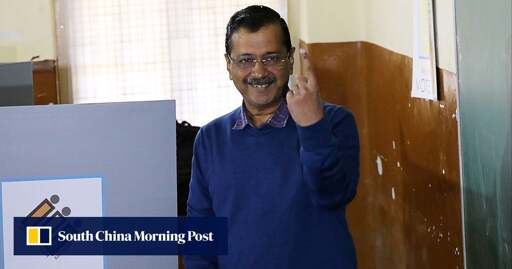Modi’s Bharatiya Janata Party is up against the AAP, led by Arvind Kejriwal, which runs New Delhi and has built a vast support base on its welfare policies and an anti-corruption movement. Kejriwal, a popular crusader against corruption, suffered a setback as he himself faced corruption allegations.
The AAP won 62 out of 70 seats in a landslide victory in the last election, held in 2020. leaving BJP with only eight and the Congress party with none. The AAP had also swept the 2015 state elections, winning 67 seats, with the BJP taking three.
Modi and Kejriwal have both campaigned vigorously in roadshows with thousands of supporters tailing them. They have offered to revamp government schools and provide free health services and electricity, and a monthly stipend of over 2,000 rupees (US$25) to poor women.
Delhi, a city of more than 20 million people, is a federal territory that Modi’s party has not won for over 27 years despite having a sizeable support base there.
Kejriwal was arrested last year along with two key leaders of his party ahead of national elections on charges of receiving bribes from a liquor distributor. They have consistently denied the accusations, saying they are part of a political conspiracy. The Supreme Court allowed the release of Kejriwal and other ministers on bail.
Kejriwal later relinquished the chief minister’s post to his most senior party leader.
The BJP, which failed to secure a majority on its own in last year’s national election but formed the government with coalition partners, has gained some lost ground by winning two state elections in northern Haryana and western Maharashtra states.
Modi’s party hopes to benefit after last week’s federal budget slashed income taxes on the salaried middle class, one of its key voting blocks.
Opposition parties widely condemned Kejriwal’s arrest, accusing Modi’s government of misusing federal investigation agencies to harass and weaken political opponents, and pointed to several raids, arrests and corruption investigations of key opposition figures in the months before the national election.
Kejriwal vowed to be an anti-corruption crusader and formed the AAP in 2012 after tapping into public anger against the then-Congress party government over a series of corruption scandals. His pro-poor policies have focused on fixing state-run schools and providing cheap electricity, free healthcare and bus transport for women.
The BJP was voted out of power in Delhi in 1998 by the Congress party, which ran the government for 15 years. In the 2015 and 2020 elections in Delhi, the AAP won landslide victories.



I thought he was flipping me off for a second.